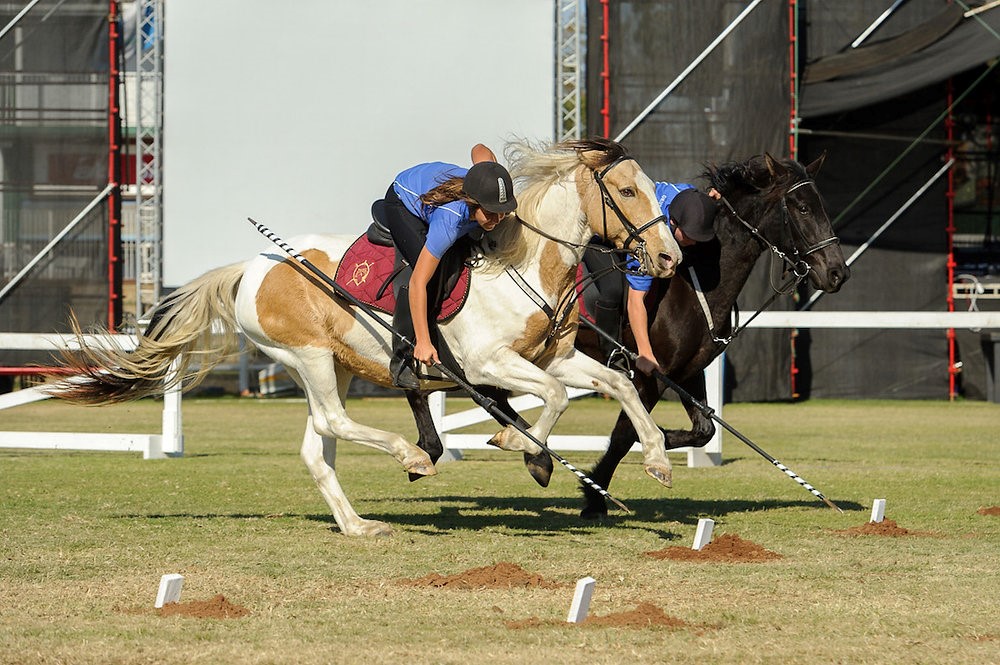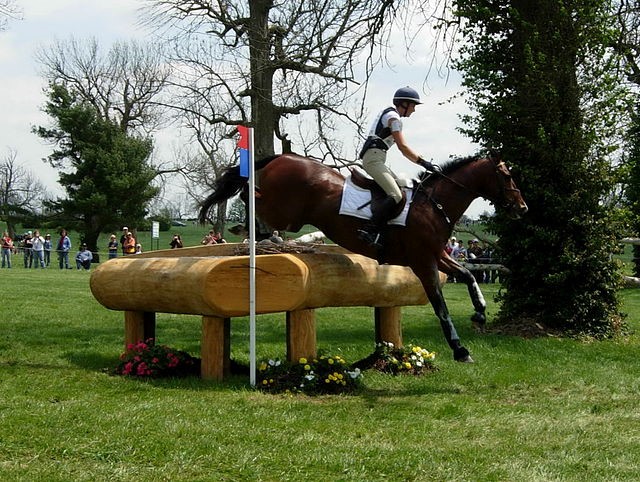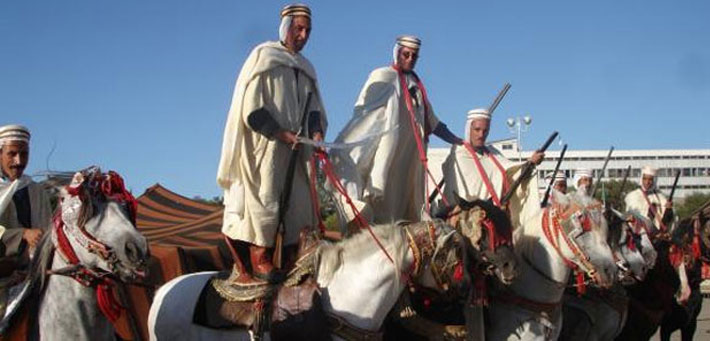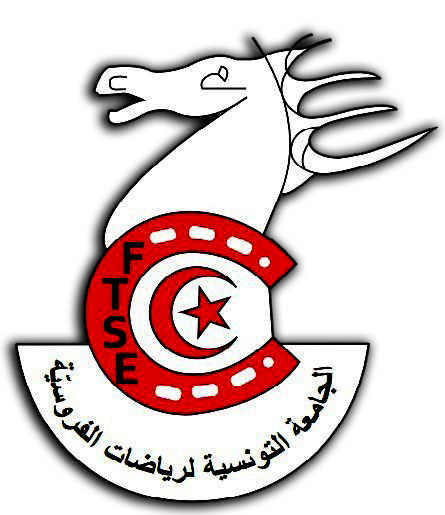
- Details
- Discipline Catégorie
Tent Pegging is one of the ten equestrian disciplines recognized by the International Equestrian Federation. It is practiced with a lance. The rider, galloping, must pick up and carry away a target placed on the ground with their weapon.
It is a discipline originating in Asia.
Tent Pegging is likely related to the idea of riders attacking an enemy camp on their horses, using their lances or swords to uproot tent poles, causing the tents to collapse.
This sport simply involves a rider galloping on horseback while using a sword or lance to pick up and carry away a small target on the ground. This event can be individual, whether it be a sword or a lance.
The target on the ground is a symbolic tent pole.
There are many Tent Pegging events:
- Individual sword or lance race
- Half-section sword or lance race
- Full section sword or lance race
- Single file sword or lance race


- Details
- Discipline Catégorie
Eventing is an equestrian triathlon in which the rider and their mount compete in three successive events within a single discipline: dressage, cross-country, and show jumping.
This discipline has its origins in armies where horses were used as a means of transporting heavy weapons, hence the need to select strong, endurance-rich, and well-trained horses.
Horses must be attentive, forthright, and have endurance to perform well in all three events.
The aim of this discipline is to demonstrate the versatility and connection of the horse/rider partnership.
Eventing is one of the seven world equestrian disciplines sanctioned by the International Equestrian Federation (FEI) and has been an Olympic discipline since the 1912 Stockholm Olympic Games.
Eventing therefore consists of three events:
- Dressage: The dressage event consists of presenting a compulsory program with figures at the walk, trot, and canter, demonstrating respect for the horse's style and obedience.
The horse-rider pair performs a series of approximately twenty test figures on a rectangular arena measuring 60m by 20m. The pair will be evaluated by a jury, which will award a score from zero to ten based on the ease and fluidity of the movements performed. The jury will also award overall scores to judge the precision of execution, the horse's submission, the quality of the gaits, the impulsion, the rider's position, and the harmony of the pair.
- A cross-country event where rider and horse take on a course on varied natural terrain: plains, woods, fords, hills, bridges, dotted with fixed natural obstacles: tree trunks, ditches, hedges, and water crossings, over a long distance at a sustained pace; it is a test of strength and perseverance.
- Show Jumping is a decisive event in eventing, judging the precision and agility of the horse-rider combination. The pair overcomes a dozen obstacles in a set order without knocking them over or slipping through them. The horse must show freshness after the cross-country event.
Eventing is a competition that requires two veterinary visits: the first before the dressage competition to ensure the horse's general condition allows it to compete at this level, and the second after the cross-country competition to ensure the horse is not injured and is not too tired to complete the third and final competition, show jumping.
The final ranking is determined by the total points earned in these three competitions: the dressage score plus the number of penalty points earned in the cross-country competition (horse refusal at the obstacle, exceeding the maximum time allowed) and the show jumping competition (falling from a pole, refusal, exceeding the maximum time allowed). If the rider falls during one of the competitions, they are eliminated and will not be able to participate in the other competitions. The winning pair will be declared the winner if they obtain the lowest total points.


- Details
- Discipline Catégorie
Symbolizing warrior virtuosity, the Fantasia ensures the continuity of an authentic military equestrian tradition. Simulating traditional military action from the 19th century, it reproduces the assaults of Arab and Berber military tactics, where a swift retreat follows a sudden attack. Today, the gunpowder charge, or baroud, has replaced the crossbow shot. The training of the horses, Barbs or Arab Barbs, follows specific rules: the rider and his mount must recognize the exact sequence of prepared maneuvers in unison. On a delimited field, teams ranging from two to twenty riders fill the air with the sound of their charges.
To perform these feats, riders must master excellent equestrian technique, as well as possess agility, audacity, and courage. The Fantasia remains one of the most appreciated equestrian displays throughout the Maghreb. In Tunisia, distinctions are made between "le Nchef," corresponding to the full gallop military charge punctuated by baroud shots, and "le Mdaouri," the equestrian figures that the rider imposes on his horse to the beat of popular music with the sound of the Tabla (drum) and Zakra (flute).

- Details
- Discipline Catégorie
Equestrian tourism is a leisure activity that allows people to explore regions by covering long distances on horseback.
It is not necessary to have an excellent level of riding to practice equestrian tourism. However, complete beginners should familiarize themselves with horseback riding at a local equestrian center for one or two months beforehand to achieve the level known as "comfortable at the three gaits" (walk, trot, and canter), as the common expression goes.
The average duration of an equestrian trek ranges from four to six days.
Equestrian tourism offers several advantages:
- The rider's elevated position on the horse allows for a far-reaching view, often above hedges,
- On suitable terrain, trotting or galloping gaits allow the rider to quickly pass through monotonous landscapes,
- The equestrian traveler is constantly available to observe the scenery; wildlife feels no fear towards the horse, which masks the scent of the rider,
- The rider travels safely on rural paths that allow entry into the heart of a region.
The contact with the horse over several days also provides a unique and enriching experience.

